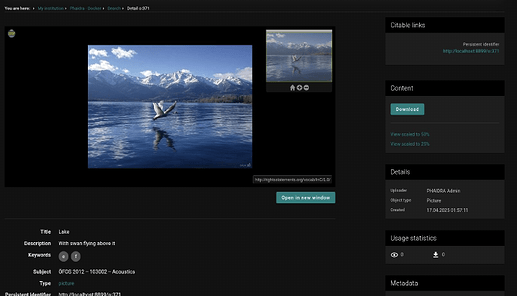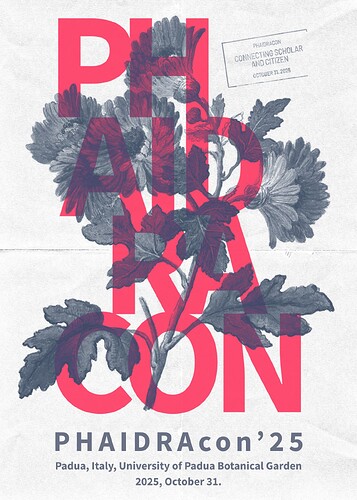On Thursday April 17, 2025 we had our first community call. We can consider this as being pretty successful with 25 people attending. This is a great start, but we definitely envisage more people joining.
We set up Zoom Community Calls to inform the community on what is going on with the project, the software, and everything else we are working on that will benefit your data management in the years to come. Or maybe to rephrase this, these calls are meant to foster and build community around PHAIDRA.
The calls and, of course, this forum is a place for providing feedback about working with PHAIDRA. Please let us know what features you are currently missing, and you would love to have in PHAIDRA.
In this last call, Gianluca Drago updated us on PHAIDRAcon 2025, Raman updated us on the current state of the PHAIDRA project and Rasta provided insight on the development of PHAIDRA itself.
Arran Griffith from the Fedora project gave an overview of the state of Fedora and announced the coming Fedora Camp hosted at the University of Vienna.
PHAIDRA Development
Fedora 6 migration
Univie started the migration to the new PHAIDRA version based on docker and Fedora 6 last year. We have migrated 9 instances. 3 instances are still due because of additional challenges like the fact that we need to migrate Book objects and also the size of our production instance, where the Fedora migration alone would take weeks.
We are also working on a cloud ready PHAIDRA version. In context of Austria’s research data management, the project ARI&Snet has started, where an infrastructure for shared services should be built. The infrastructure is based on an OpenShift Kubernetes cluster, and 3 instances should be migrated/built on to this infrastructure (depot.phaidra.at, e-book.fwf.ac.at, Suttneruni instance)
Developments
PHAIDRA is being intensively developed. Sandeep, our external developer, works on most of the issues. Giulio and Yuri from Padova help us with issues around style, accessibility and transaction support, while they are preparing their migration path.
Since November, more than 190 issues have been identified, with more than 120 already resolved. Here are examples of some issues which were addresed:
- Improving accessibility
- Improving style, dark theme
- Fedora 6 transactions
- .OBJ (3D) support
- Usage statistics
- Owner/User search
- PDM license added
- Submit form for Open Educational Resources
- Templates management
Some bigger issues are in front of us (still in requirements engineering phase)
- Facets / Search filters (also Resource type vs cmodel)
- Bulk metadata and access rights editor
- Rights management (Roles)
- Markdown support
- RSS Feed
- Extended DateTime Format
- User data archivation
- Uwmetadata to JSON-LD migration tools
- File format check during ingest
- Fulltext search - OCR / PDF
Some developments in the pilot phase
- Bulk upload - the tool is integrated directly in PHAIDRA UI and manages status via local storage to enable the user to pause/continue upload
- Bulk download - this tool requires it’s own backend. The objects are downloaded into a folder in the backend the user needs to have access to. Input is the CSV export from PHAIDRA’s search.
- Catalogue-fetch-upload - this tool fetches metadata from library’s catalogue (Alma in Austria) based on the catalogue identifier. Users only have to (or can) define additional necessary fields (like license, which are typically not in catalogue metadata).
Fedora Update
Fedora is the open-source digital repository that provides the preservation support for PHAIDRA repositories. Our global community of users is as vibrant as it is diverse – with users from a wide variety of institutional types and sizes, all using Fedora to support their long-term digital preservation in similar, yet unique ways. Meet some of our users here: Fedora Users - Fedora
The program team consists of 2 paid staff members – Arran Griffith, Program Manager, and Dan Field, Program Developer. The Fedora Governance Group represents the community and serves to establish program priorities, and makes decisions on program sustainability. Development and technical support is done primarily by a team of volunteer Fedora Committers and the active Technical Team.
Current Work
We just began work on a large-scale dependency update project, aimed at modernizing the current Fedora code base by updating outdated dependencies and increase unit and integration test coverage. We will be sharing information about how to get involved with this effort in the coming weeks, but we are seeking any individuals with experience in the Fedora code base to help us achieve this goal. More details on the Dependency Update Project can be found on the Fedora GitHub repo, or on the Fedora wiki.
Get Involved
There are many ways to get involved in the activities of the Fedora Community:
- Slack – get technical support, hear about what others are doing, connect with fellow Fedora users.
- Weekly Tech Meetings – Have a question? Need help with something? Join us every Thursday at 11am Eastern on zoom.
- Newsletter – subscribe to our monthly newsletter to stay in the loop about what is happening in the Fedora community.
- Email us – Have a question and not sure where to look? Just send us an email and we will be glad to help.
- Arran Griffith, Program Manager – arran.griffith@lyrasis.org
- Dan Field, Program Developer – dan.field@lyrasis.org
PHAIDRAcon 2025 - October 31st, 2025, Botanical Garden of Padua, Italy
PHAIDRAcon’25, the annual PHAIDRA community event, will be hosted by the University of Padua on October 31, 2025, at the Botanical Garden of Padua, a UNESCO World Heritage Site. The conference theme is “Connecting Scholar and Citizen: The Emerging Social and Cultural Role of the Repository.”
The event aims to explore the broader social and cultural aspects of digital repositories, which are often seen solely as tools for academic communication. The conference will focus on how digital repositories facilitate knowledge transfer and the “Third Mission” of universities, making data accessible to the public. This accessibility fosters engagement and collaboration between institutions and citizens.
Knowledge transfer can occur in two ways: from the “centre to the periphery,” where digitized cultural heritage benefits the community, and from the “periphery to the centre,” as seen in citizen science initiatives. PHAIDRAcon’25 seeks to showcase examples of these interactions, highlighting how digital repositories bridge the gap between scholars and the public.
Key focus areas include: Cultural Heritage and Community Engagement, Citizen Science and Digital Repositories, Social and Health Impact of Digital Repositories, Memory and Preservation of Third Mission Activities, Expansion of Digital Repository Content, Repositories and Environmental Conservation, Intangible Cultural Heritage and Repositories, Reuse of Digital Collections in Educational Contexts, Projects to Give a Voice to Marginalised Communities, and Digital Repositories as Accessibility Tools.
Participants with projects demonstrating a digital repository and an open dialogue between cultural institutions and citizens are encouraged to share their experiences at PHAIDRAcon’25.
More info on our dedicated category: PHAIDRAcon - PHAIDRA Community and on the website: https://phaidracon.univie.ac.at/
The next community calls are:
- Thursday, June 26: 16:00-17:00
- Thursday, August 21: 16:00-17:00
- Thursday, December 11: 16:00-17:00 – “PHAIDRA Community Year in Review & Future Outlook”


